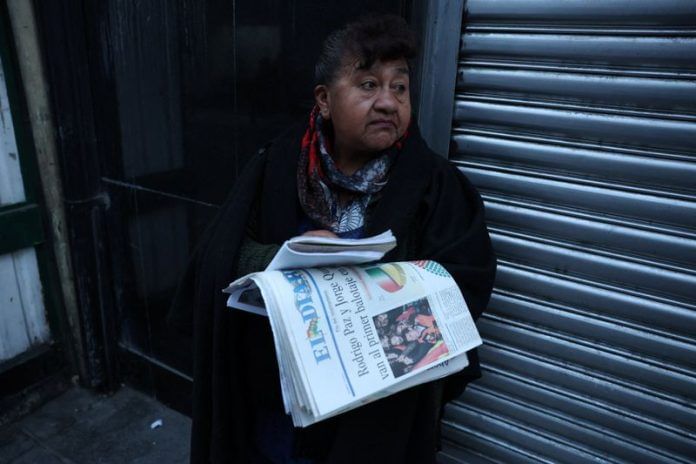By Lucinda Elliott and Monica Machicao
LA PAZ (Reuters) -Bolivians decisively repudiated the leftist party which has ruled the country for most of the past two decades in a first-round presidential election vote, likely paving the way for more market-friendly policies for its crisis-wracked economy.
Centrist senator Rodrigo Paz secured 32.18% of the vote, while Eduardo del Castillo of the Movement for Socialism, MAS, had just 3.16%, according to initial results released by the electoral tribunal on Sunday night.
Conservative former president Jorge “Tuto” Quiroga of the Alianza coalition was second with 26.94%, with over 92% of the ballots counted.
If no candidate obtains more than 40% of the vote with a 10-point lead, there will be a runoff on October 19. Full official results will be announced within seven days.
The result marked a drastic shift for a country which since 2006 has mostly been dominated by the interventionist MAS party led by the charismatic Evo Morales, although his once tight grip on the leftist coalition had already faded.
“Bolivia is not just asking for a change in government, it’s asking for a change in the political system,” Paz said in a speech broadcast on Sunday night. “This is the beginning of a great victory, of a great transformation,” he added, as his supporters chanted “renewal.”
Bolivian bonds gained nearly 3 cents, with the 2030 maturity bid at 79.69 cents on the dollar, according to Tradeweb data, its highest level this year. Investors were hopeful that a turn away from the leftist party could help the country turn its economy around, avoid a debt default and pave the way for an IMF program.
Earlier on Sunday, Quiroga acknowledged the results, confirming his place in the runoff, and congratulated Paz.
Outgoing President Luis Arce released an upbeat statement recognizing the results, saying “Democracy has triumphed.”
With a crowded field of eight contenders and no dominant MAS party candidate, the election marked a “crossroads moment” for Bolivia, said Southern Andes analyst Glaeldys Gonzalez Calanche of the International Crisis Group.
Bolivia’s fragile economy has been at the top of many voters’ minds. Price rises have surged past other Latin American countries this year, and fuel and dollars have run scarce.
Annual inflation doubled to 23% in June, up from 12% in January, with some Bolivians turning to cryptocurrencies as a hedge.
The Bolivia result also may foreshadow a death knell for other left-leaning governments in Latin America, with elections looming in Chile in the coming months and in Colombia in the first half of 2026.
Many Bolivians, especially those who work in the informal economy, were struggling to make ends meet, said economist Roger Lopez.
“Bolivia is on the brink,” said Lopez. “It has no dollars and faces obligations that must be paid in dollars, and voters understand that the coming years will be difficult.”
Paz’s strong performance surprised analysts. Opinion polls had suggested that the senator was far behind Quiroga and center-right candidate Samuel Doria Medina of the Unidad Alliance coalition. Businessman Medina conceded defeat and said he would support Paz in any runoff.
Sunday’s vote dramatized the fall from favor of Morales, once overwhelmingly popular with the pivotal indigenous Aymara voting bloc, but whose calls to boycott the election appeared to fall short.
Voter turnout was steady, authorities said. Despite earlier concerns that the electoral process could be obstructed by supporters of Morales, international observers said there were no major disruptions.
Null and blank ballots totaled 21.5%, likely reflecting some support for Morales, who had urged voters to cast null ballots in protest. Usually the share of blank and null votes does not exceed 6%.
Several minor incidents took place at polling stations in the central region of Cochabamba, Morales’ political stronghold.
The results will create an opportunity for the first time in nearly two decades for centrists and the right, which together commanded roughly three quarters of the vote, the early count showed.
“Every year the situation has got worse under this government,” said Silvia Morales, a 30-year-old retail worker from La Paz. A former MAS voter, she said this time she would cast her vote for the center-right.
Carlos Blanco Casas, 60, a teacher in La Paz, said he intended to vote for change. “This election feels hopeful. We need a change of direction,” he said.
Quiroga has promised “radical change” to reverse what he calls “20 lost years” under MAS rule. He supports deep public spending cuts and a shift away from alliances with Venezuela, Cuba and Nicaragua. Quiroga was president for a year in 2001-2002 after Bolivia’s then-leader resigned.
Paz, meanwhile, plans to decentralize government by introducing a “50-50 economic model” in which the central government would manage only half of public funds. The remainder would be designated to regional governments.
Voters also elected all 26 senators and 130 deputies, who will take office on November 8.
(Reporting by Lucinda Elliott in Montevideo and Monica Machicao in La Paz, additional reporting by Daniel Ramos in La Paz, Camille Ayral in Mexico City and Libby George in London. Editing by Daina Beth Solomon, Rosalba O’Brien, Marguerita Choy, Brendan O’Boyle, Michael Perry, Kate Mayberry and Giles Elgood)
Disclaimer: This report is auto generated from the Reuters news service. ThePrint holds no responsibility for its content.




